IOS and IIIT jointly organize a two-day online international conference on “Personality and Contribution of Muhammad Asad as an International Journalist, Linguist, Political Theorist, Mufassir and Scholar of Religions in 20th Century”
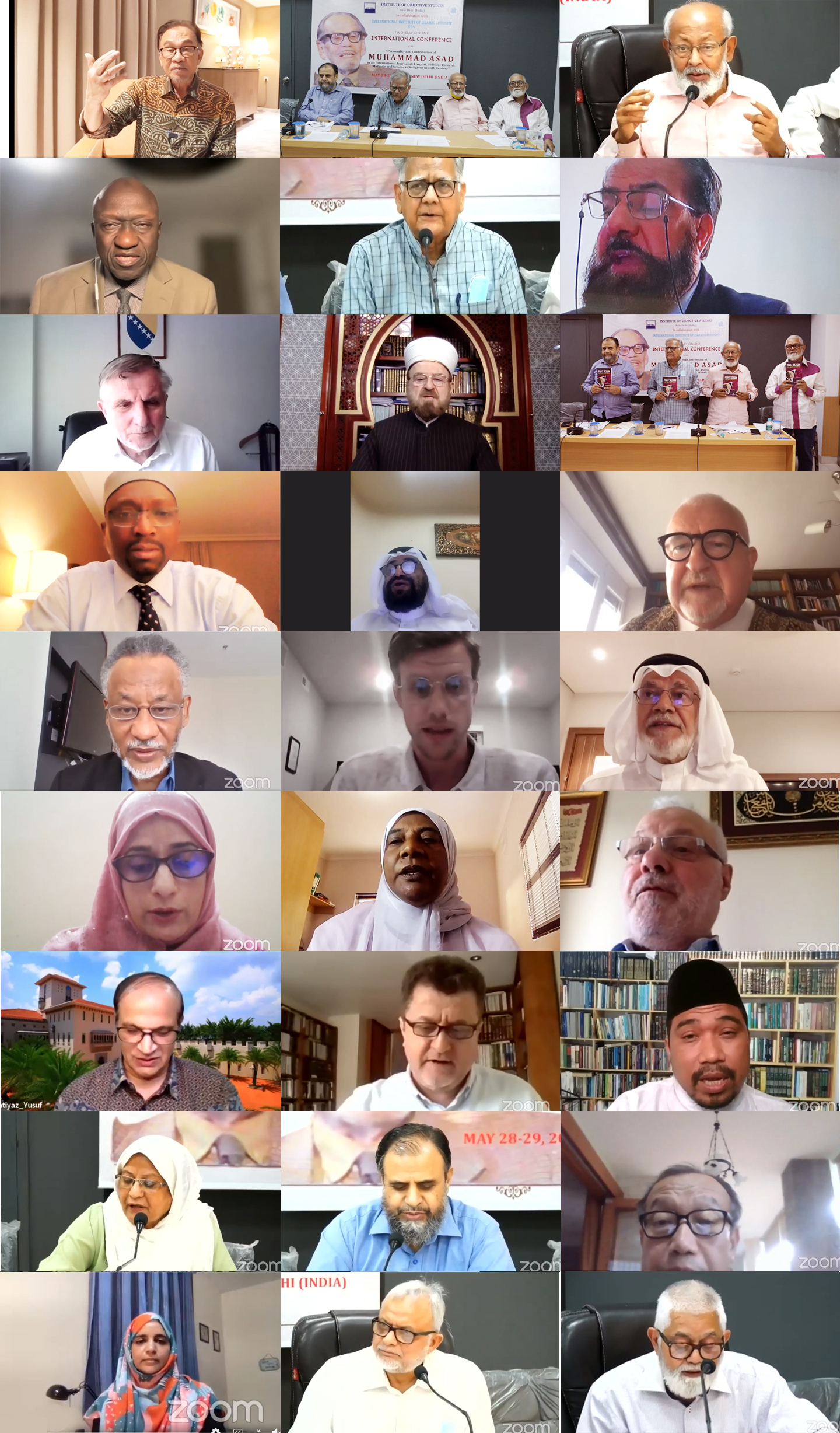
IOS and IIIT jointly organize a two-day online international conference on “Personality and Contribution of Muhammad Asad as an International Journalist, Linguist, Political Theorist, Mufassir and Scholar of Religions in 20th Century”
New Delhi, May 30, 2022: A two-day online international conference on “Personality and Contribution of Muhammad Asad as an International Journalist, Linguist, Political Theorist, Mufassir and Scholar of Religions in 20th Century” was organized by the Institute of Objective Studies (IOS) on May 28-29, 2022, in collaboration with the International Institute of Islamic Thought (IIIT), USA.
Inaugural Session
The inaugural session commenced with the recitation of a verse from the Holy Qur’an by the in-charge of the Urdu section, IOS, Maulana Shah Ajmal Farooq Nadvi, along with the English translation.
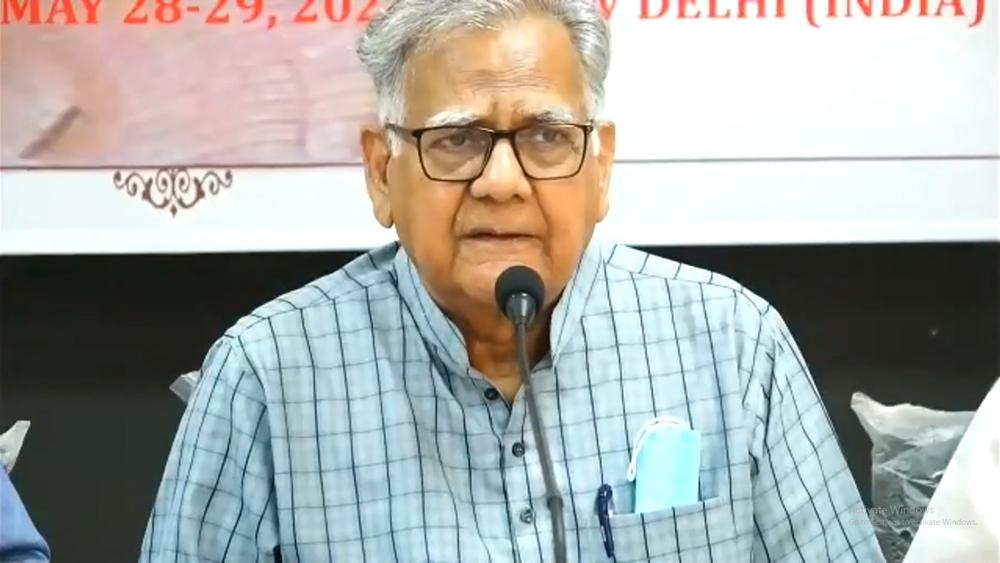
Welcoming the participants, Prof. Z. M. Khan, Secretary General, IOS, briefly highlighted the activities of the Institute of Objective Studies. He said that his association with the institute has been for more than two decades. The institute had completed 36 years of its existence. During this period, the institute reached out to people through its publications, seminars, conferences, etc. The institute has a highly democratic set-up with the top decision-making bodies, like governing council and the general assembly. In order to carry on its activities in the field of research, several committees are in place. He observed that the institute conducts surveys on the state of the socio-economic plight of minorities and deprived sections. Besides, the institute builds a rich database on a variety of subjects. With a view to broad-basing its activities, the institute has five chapters at different places in the country, keeping in view the regional aspirations. Referring to the procedure for selecting projects, he said that specialized committees are in existence to shortlist them. The institute regularly organizes seminars, symposia, and conferences at national and international levels. The institute also organizes summer and winter school programmes for the benefit of research scholars to work on the preparation of textbooks and reference books in progress. A translation bureau is in place to get books on Islam translated into English, Hindi, Urdu, and other regional languages. The institute also invites reviewers to review the books published by the IIIT. An updated data bank has been developed to cater to researchers. The feedback available with the data bank is very useful for those who concluded studies on various issues. He said that Muslims and the marginalized sections are mainly the focus of research. Projects concerning these areas are approved, keeping in mind the financial resources.
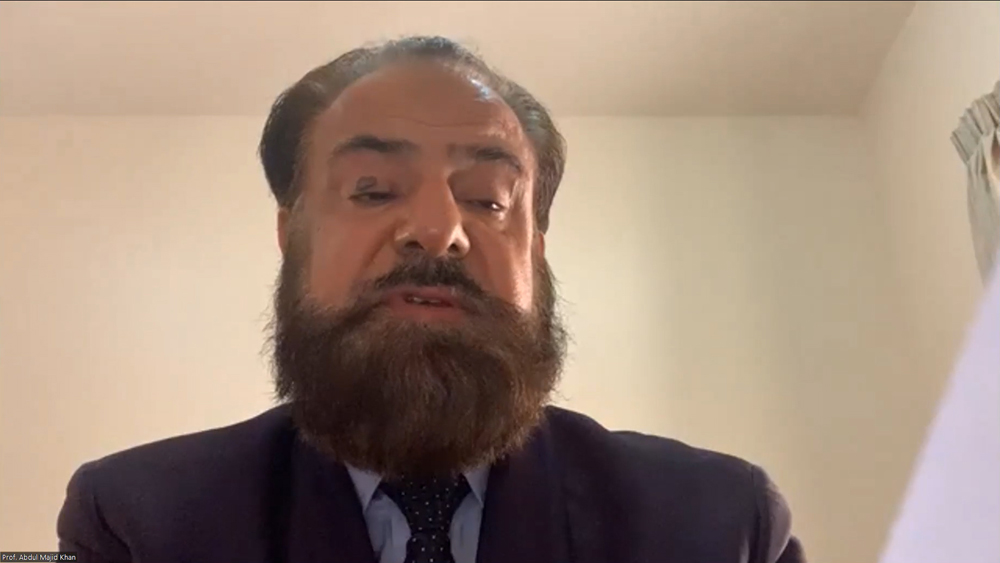
Prof. Abdul Majid Khan, Dept. of Islamic Studies, Aligarh Muslim University, Aligarh, presented the profile of Muhammad Asad. He said that Asad was a writer, translator of the Qur’an, diplomat, and journalist who bridged the gulf between East and West. He knew several languages, including German, French, and Polish, and could speak them fluently. He joined the Austrian army at a very young age and then became a journalist. At the age of 22, he became a correspondent, and that afforded him an opportunity to travel to Syria and Afghanistan. In 1926, he embraced Islam and turned to writing about it. He made a political entry into Pakistan as its secretary of state and later became the permanent representative of the country at the United Nations. As an author, he explained how Muslims could be revitalized. He believed that this could be achieved by means of spiritual pursuits and social activities. In 1961, he published another book in which he held that sovereignty lay in God. His translation of the Qur’an, “The Message of Qur’an,” was one of the most notable of his works. It was specially meant for non-Muslims. He wanted Muslims to grow with the interpretation of the Qur’an. He used to quote the Prophet Muhammad (PBUH) in this connection. He also opined the doors of Ijtihad (Independent or original interpretation of problems not precisely covered by the Qur’an) should always remain open. He concluded by saying that Muhammad Asad significantly contributed to Islam and remained optimistic about Islamic teachings.
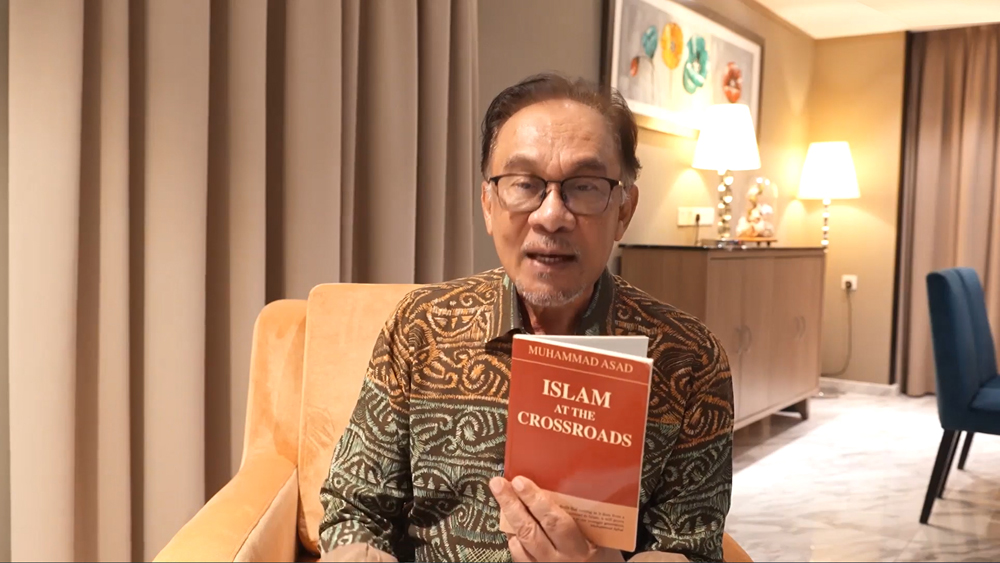
Inaugurating the conference, H. E. Dato Seri Dr. Anwar Ibrahim, Former Deputy Prime Minister of Malaysia, through a pre-recorded video message said that Asad was a charismatic personality. His desire was to provoke young Muslims to think, research, and contribute. In his book, “Islam at the Crossroads,” he talked about education among Muslims, the Western sources of Islam, and changing paradigms. He pleaded for rising beyond narrow vision. He believed that one should be truly independent in thought. He observed that Asad adopted a positive approach from the life of the Prophet Muhammad (PBUH). A perceptive analysis of society and change based on faith, culture and tradition must be made. He noted that Dr. Allama Iqbal recommended his works to Islamic scholars. Knowledge and experience allowed him to visualize tradition and change. He batted for the promotion of critical thinking and the propensity to condemn the infidels. He attempted to revitalize knowledge of the present. He had called Western society completely obsolete and devoid of ethics. Similarly, he strongly critiqued Zionism. One thing that made him different from traditional scholars of Islam was that he kept himself away from contemporary Muslim movements. Asad was a man of thoughts, he concluded.

Delivering the keynote address, Dr. Josef Linnhoff, Research Fellow & Editor-in-Chief, Institute for Advanced Usuli Studies, Columbus, Ohio, USA, held that Asad wrote on the past, present and future of Islamic thought. He was not in favour of European secularism. During his stay in Pakistan, he had suggested a different model of state. He was a thinker more than what was recognized by the world. He was an independent thinker of Islam who never joined Jamat or Jamat-e-Islami. He visualized though an Islamic state, but based on social and liberal thought. The reason why he wrote the book “The Message of Qur’an” was a rationalistic expression of thoughts. He said that Asad viewed prophets as apostles. He firmly believed that Islamic law was only Shariah law, which stemmed from the Qur’an and Sunnah. The true Shariah was not only easy to comprehend but also much smaller in volume than pseudo-shariah evolved through the Fiqh of various schools of thought. He was a very unbiased person who studied Islam and other religions. Asad was a very sensitive Muslim who was particular about his thoughts. Referring to racialism, he said that racism quashed religious freedom. In his biography “The Road to Mecca,” published in 1954, Asad explained why he converted to Islam. He could speak intellectual languages of both Islam and the West. The book explained Asad’s choice in a way that was accessible to the western reader and provided plenty of unbiased information about Islam. In his journey to conversion, Asad discovered himself, he added.
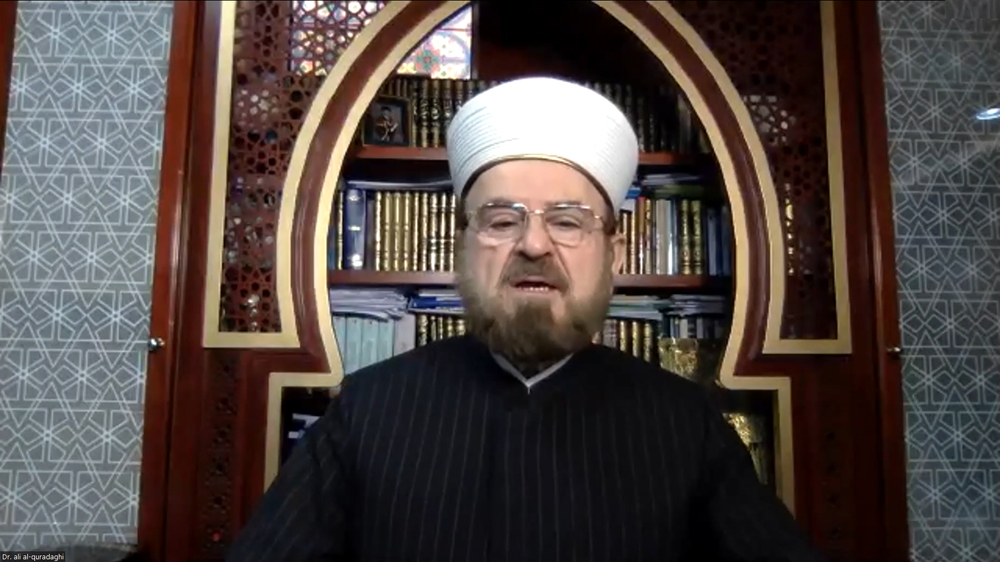
Speaking as the guest of honour, Dr. Ali Muhiuddin Al-Qaradaghi, Secretary General, International Union of Muslim Scholars, Qatar, observed that “The Road to Mecca,”Asad’s famous memoir, helped introduce Islam to countless people. Born as Leopold Weiss in 1900 to Jewish parents whose forefathers were rabbinical clerics, he formally converted to Islam a few days after the Berlin trip. When he died almost a century later, in 1992, he was an acclaimed intellectual known all over the Muslim world as Muhammad Asad. He noted that Asad first encountered the Muslim world in 1922 when he travelled to Palestine at the invitation of his uncle, who was a psychiatrist. That was a time of political upheaval and strife in Palestine. Zionists were lobbying for the Jewish nation–sometimes violently. Asad’s anti-Zionism was deeply rooted, and it was not something to make him more acceptable to Islam, he concluded.
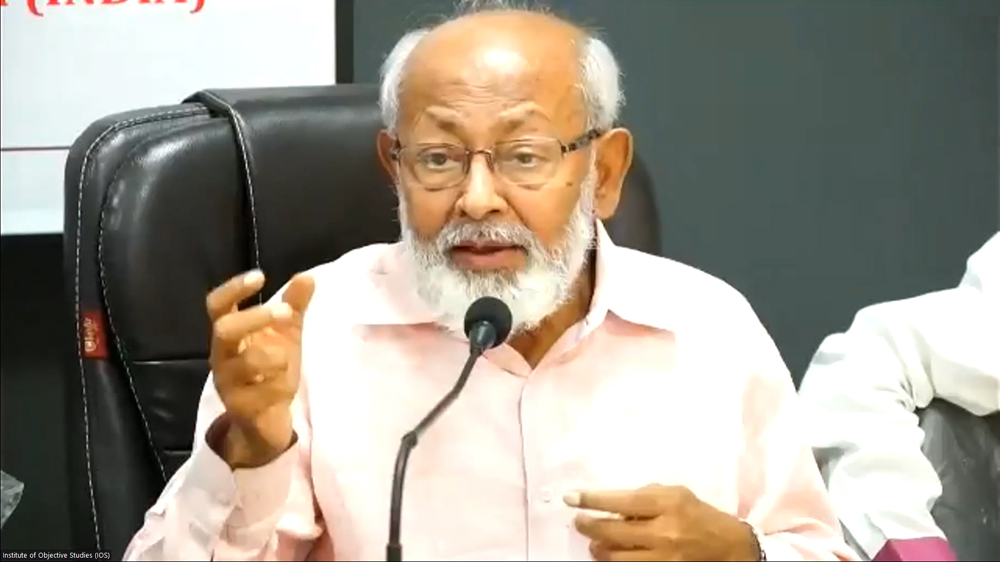
In his special observation, Dr. M. Manzoor Alam, Chairman, IOS, explained that the institute was regularly organizing international and national conferences on the personalities who contributed significantly to the study of Islamic thought and the teachings of the Qur’an and Hadith from a global perspective. The idea behind these conferences was to seek the opinion of scholars and researchers nationally and internationally. He said that the present conference was the outcome of the request made by the IOS to the IIIT for organizing an international conference on Muhammad Asad, whose seminal work on the Qur’an was recognized by Islamic scholars all over the world. His contribution to the Muslim community as a Muslim thinker and intellectual was immense. Calling Asad a visionary, he said that during one of his stays in Afghanistan, he (Asad) pointed out how Islam was losing its sheen with its people abandoning the precepts of the Qur’an and the teachings of Prophet Muhammad (PBUH). He was a pioneer in indicating to the intellectual stagnation and cultural decay Muslims were going through at that point and called for the revival of Islam. He observed that Asad reminded the people of the rich history of Islam. Muhammad Asad envisioned the Islamic state to have democratic principles where the interest of each person was protected and guaranteed by the laws. He regretted that Asad did not receive the spotlight he deserved. His life was nothing short of an inspiration for Muslims across the world, and still, Asad’s life was relevant in contemporary times, Dr. Alam said.
Further, he commented that many believed that Muhammad Asad’s conversion to Islam was a result of his critique of Zionist philosophy, dissatisfaction with the political, social and religious beliefs of Europe and romanticisation of the Arab world. However, Asad’s visionary dedication towards transforming how European viewed Islam could not be reduced to just these factors. He pointed out that the act of criticizing Muhammad Asad for not belonging to any particular group due to the multiplicity of his personality and ideologies raised pertinent questions about binaries and the limitations of reducing someone’s unique identity into a homogenized group. He contended that Muhammad Asad could be considered a Mujtahid because he used the tools of Ijtihad. Islam had given special importance to Ijtihad because it was the only way to resolve issues pertaining to Islamic society. Muhammad Asad’s background in the socio-psychological mould helped play a major role in the translations of the Qur’an and Hadith. He maintained that Asad’s translation of “The Message of the Qur’an” was meticulous and very close to the original meaning of the verses in the Qur’an. Muhammad Asad highlighted safeguarding the consciousness of the Muslim community—unity among Muslims—and called for adopting the teachings of the Qur’an without getting influenced by the culture and rituals, he added.
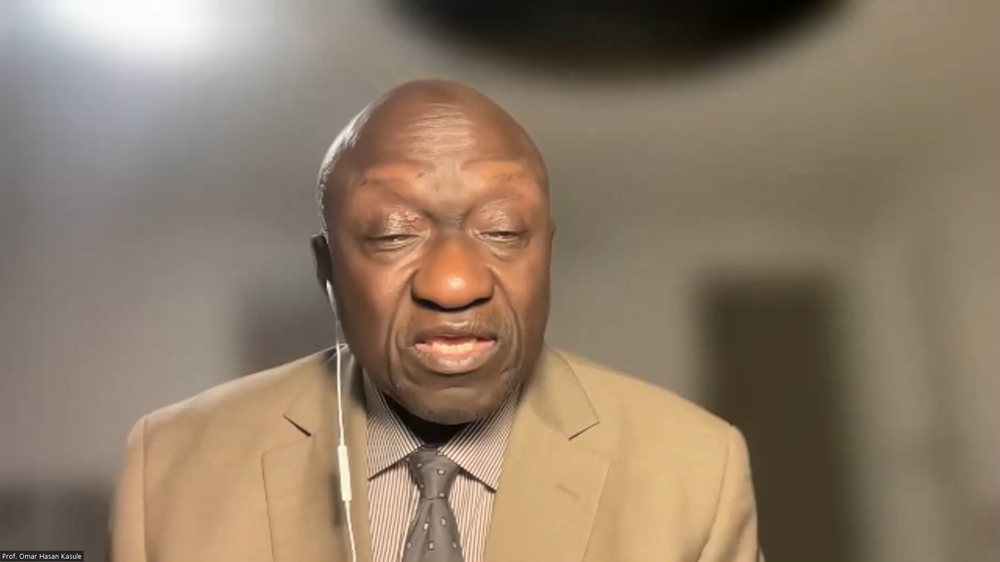
In his presidential remarks, Prof. Omar Hasan Kasule, Secretary General, IIIT, USA, hailed the IOS for reviving the knowledge of people and scholars. He said that the institute had been holding such conferences and one looked forward to several more conferences in future. He hoped that the proceedings of the present conference would be published soon. He asked the participants to evaluate and understand Ilmul Rijal (the science of knowledge) fully. The works of scholars and their impact on society should be evaluated. Referring to Muhammad Asad, he said that he was present in all the stages of the Islamic Republic of Pakistan. He spent time in Palestine and Pakistan and knew about scholars’ plagiarism. He said that Hadith and its narratives should be closely looked at. Narratives had been graded, and a review system needed to be applied to examine them. He insisted that research should be undertaken to examine the life and contribution of Muhammad Asad. At a time when morality had been marginalized, the science of knowledge should be developed by generations. He said that Imam Malik was the originator of Ilmul Rijal. While all future scholarships would be of high quality, one had to be very careful about the biographer. He also called upon the researchers to write about the scholars of today. He advised that one had to be careful while writing about living scholars. Deep study and maximum information on the scholars were needed to write on them. A deep understanding of the subject was necessary to profile intellectual biographies, he concluded.
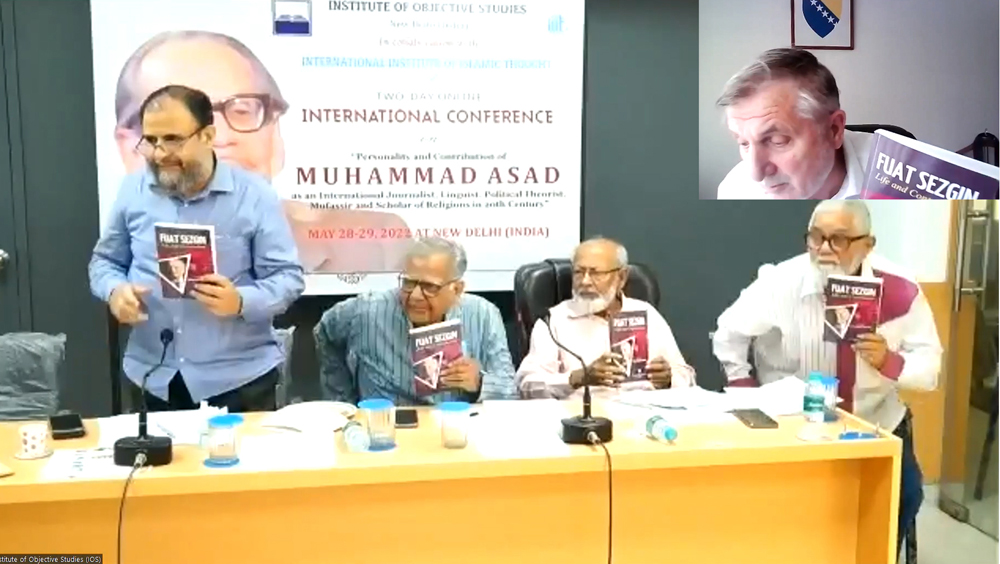
The occasion was marked by the release of a book published by the IOS. The book titled “Fuat Sezgin: Life and Contribution,” edited by the late Prof. Ishtiyaque Danish, Former Finance Secretary, IOS, was released by Muhamed Cengic, the Ambassador of Bosnia and Herzegovina to India.
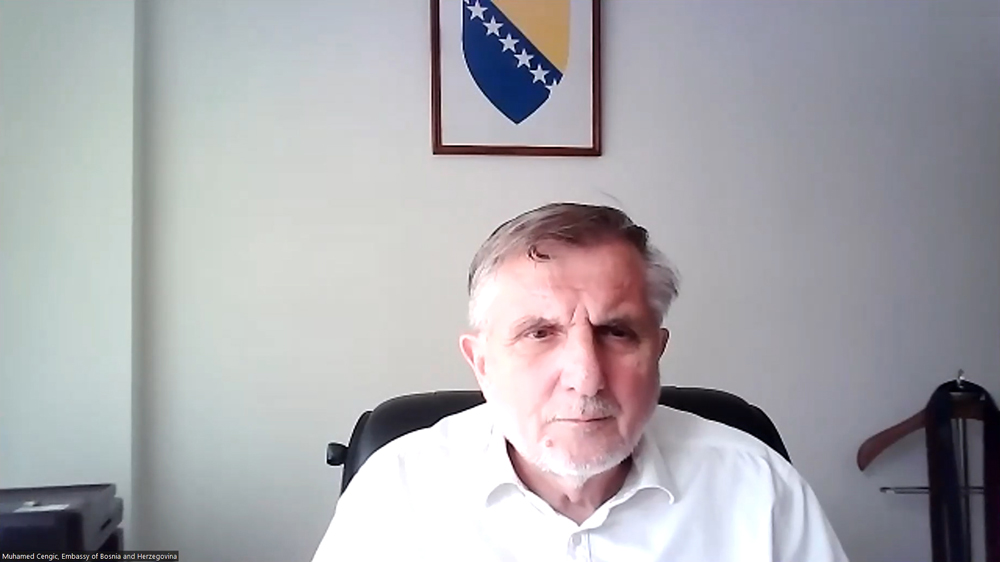
Addressing the conference, he thanked the institute for giving him an opportunity to release the book. Describing Fuat Sezgin as a great personality, he hoped that the book would prove to be a source of inspiration to young scholars. His contribution to science and technology was equally significant, Cengic said.
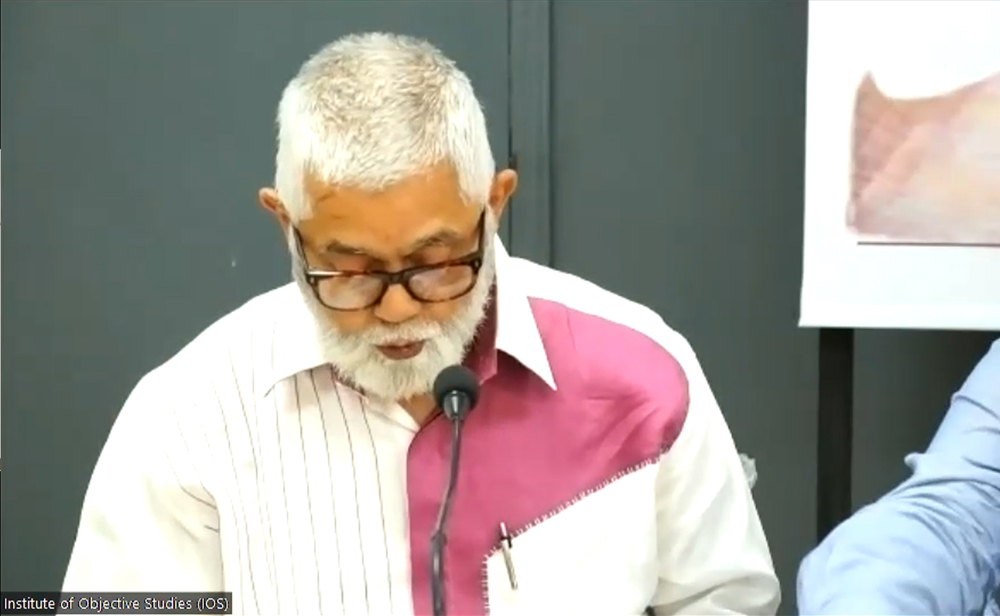
The inaugural session ended with a vote of thanks extended by Prof. Syed Jamaluddin, the director of the IOS Centre for Historical and Civilizational Studies, Aligarh.
Technical Session-I
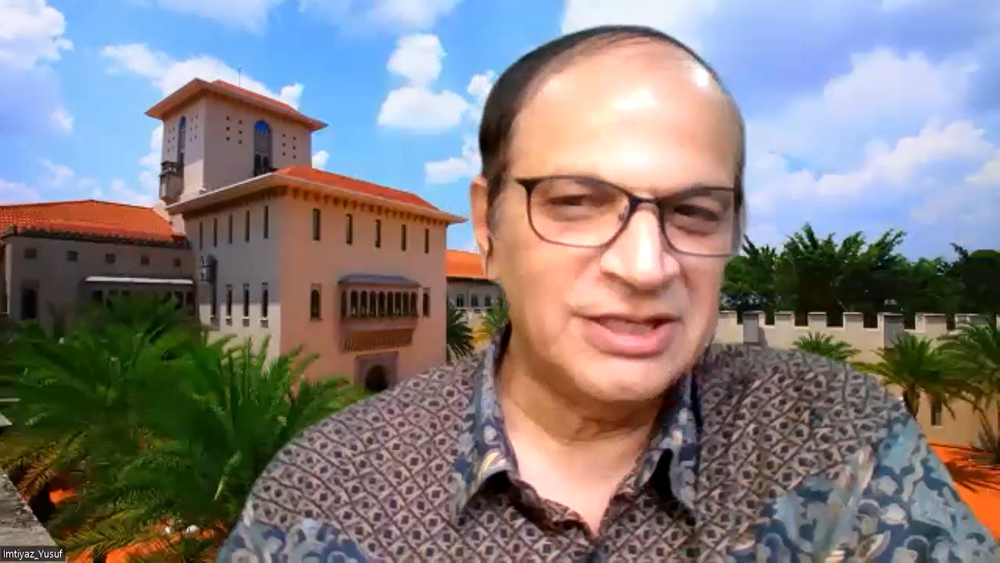
The first technical session was devoted to the theme-‘Muhammad Asad: Personality, Orientations and Thought’. It was chaired by Prof. Imtiyaz Yusuf, Associate Professor, ISTAC, Malaysia.
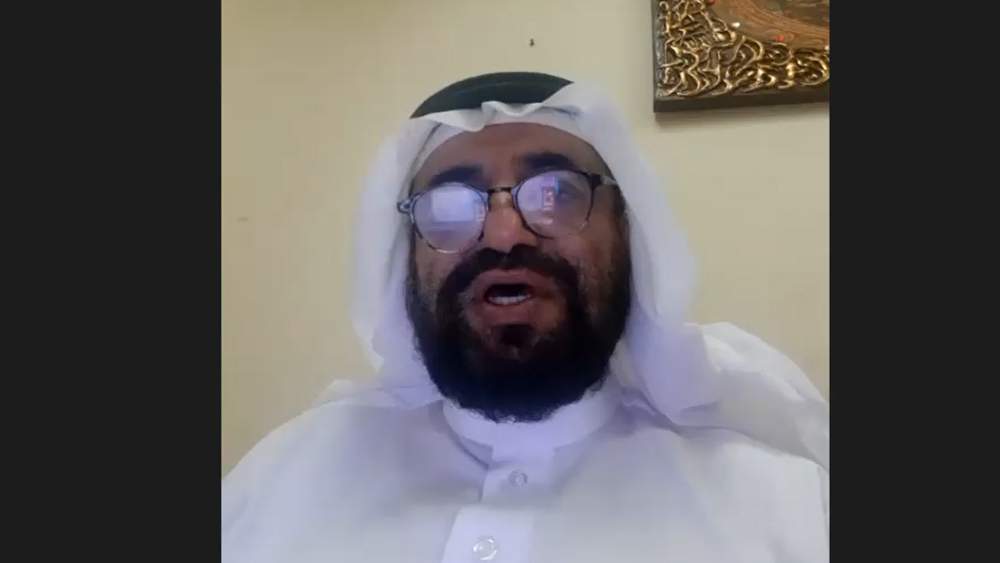
Dr. Abdullah Fahad Al-Lheedan, Visiting Professor, KSA, was the key speaker who focused on Muhammad Asad as a Mujaddid. He said that every century had a Mujaddid, and Muhammad Asad was one of them. When Asad announced his conversion to Islam in 1926, he saw Islam as a religion capable of extricating him from his personal and spiritual crisis. Thus when he saw Muslims praying in the Ummayyad Mosque, he said: “I felt the need to understand the spirit of these Muslim people because I found in them an organic cohesion between thought and senses. That cohesion that we Europeans had is lost, and I think that through a closer and better understanding of their lives, I can discover the missing link that causes the suffering of Westerners, which is the erosion of the internal integration of the European personality.” However, in the third stage, Muhammad Asad described the division between Islam and Muslims, in his short words, as “a tragic loss that prevailed over the Islamic world,” Dr. Abdullah Fahad Al-Lheedan noted. Prof. M. Ishaque, Dept. of Islamic Studies, Jamia Millia Islamia, New Delhi, spoke on “Intellectual Legacy of Muhammad Asad as reflected in “The Message of the Qur’an”. He said that in Geneva, he re-studied the translation of the Qur’an, which was different from the old translations. After 17 years of hard work, he completed the translation of the Qur’an. He never claimed that he had an exhaustive knowledge of the Holy Book. He answered why Allah’s message was revealed in Arabic and that too to the Arabian prophet. As humans, worldly people could not have the capacity to raise such questions. His translation of the Qur’an was different from the classical translations. He translated the Qur’an and wrote commentaries on it. He firmly believed that “God is self-sufficient and needs no human help.” He observed that Asad’s translation and commentary were significant contributions to the study of the Qur’an. Asad was of the view that Jihad in Islam was not offensive but defensive. “God does not love aggressors and is beyond the reach of human perception”, he added.
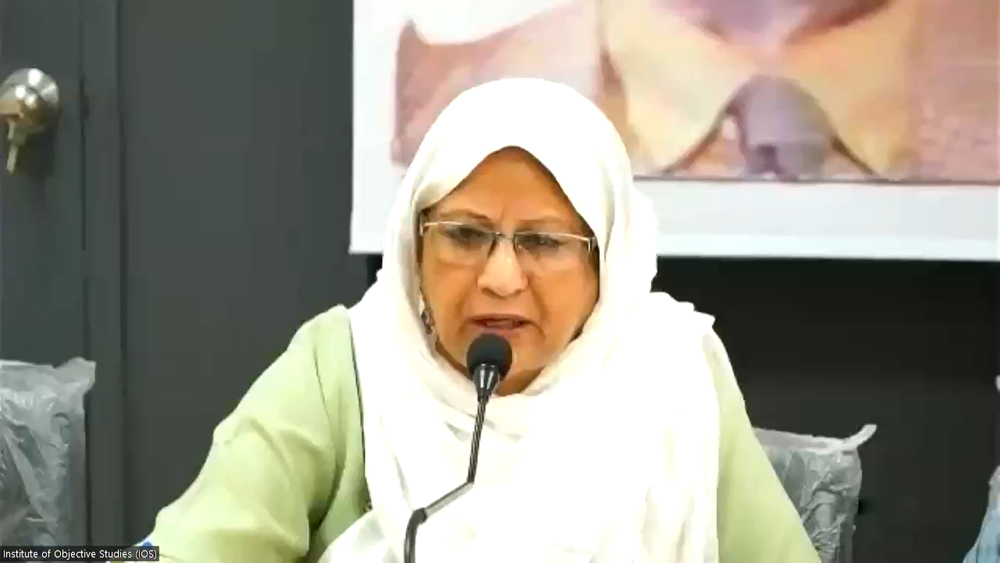
Prof. Haseena Hashia, Former Professor of Geography, Jamia Millia Islamia, New Delhi, touched upon “Muhammad Asad–A great Islamic Intellectual.” Speaking briefly about Asad, she said that he was born a Jew and converted to Islam after having spent time with Muslims in Palestine as a news reporter for a German newspaper. By 1926, he got all the answers and scepticism and doubts about Islam and Muslims, leading to his conversion to Islam, and changing his name to Muhammad Asad. She said that Asad spent a good time in Mecca and Medina. He met the poet of the East, Dr. Allama Iqbal who asked him to stay in British India. For him, Islam was a balancing religion. Whatever he said in the translation of the Holy Qur’an, he never forgot to make explanatory notes wherever necessary. He tried to mention the original names of the companions of the Prophet Muhammad (PBUH), she remarked.
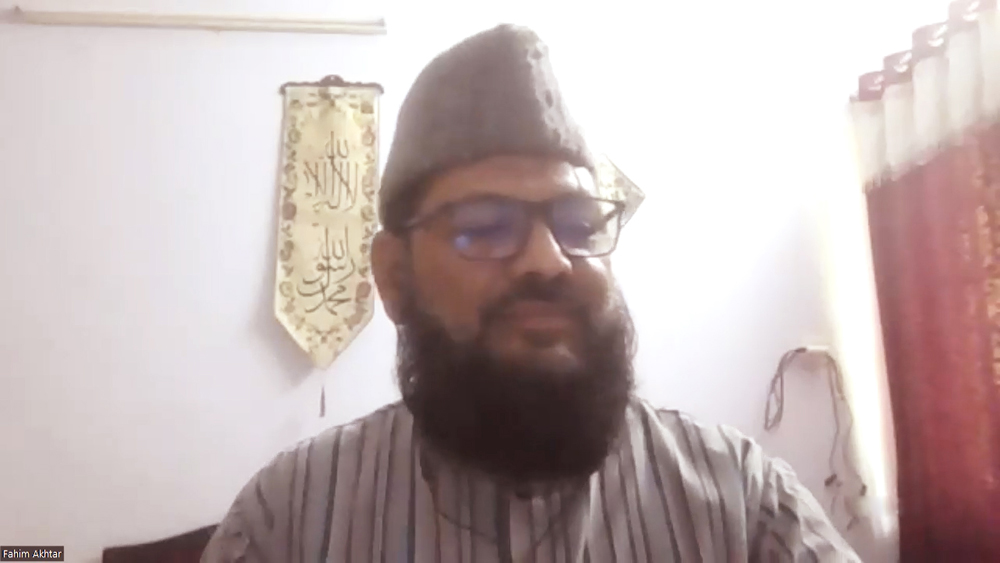
Prof. Fahim Akhtar Nadvi, head of the department of Islamic Studies, Maulana Azad National Urdu University, Hyderabad, focused on “Muhammad Asad in the light of his book ‘Road to Makkah’”. He observed that Asad lived a life full of struggles and experiences. He was born a Jew and brought up in a Rabbi family. He received early education in Jewish tradition. His work was a European discovery of Islam. He was a Muslim of European origin. He believed that more than a faith or religion, Islam was a way of life in the true sense of the term. In Islam, body and soul were integrated, he opined.
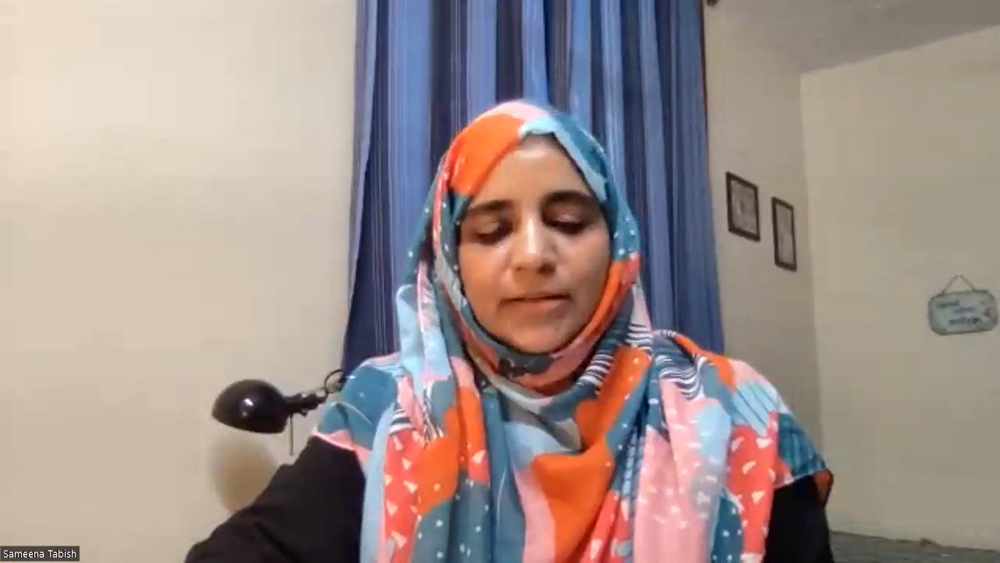
Dr. Sameena Kausar, Assistant Professor, Dept. of Arabic, Maulana Azad National Urdu University, Hyderabad, presented her paper on “The Role of Reason and Rationality in ‘The Message of the Qur’an’ by Muhammad Asad”. In her presentation, she called him one of the distinguished scholars of Islam who worked as a bridge between Islam and the West. Referring to his difference from several scholars, she said that it was obvious due to the deeper knowledge of understanding. He spent several years in Saudi Arabia and saw himself practicing Islam. His magnum opus “The Message of the Qur’an” was etymological as well as a rationalized work. She described the Qur’an as an integrated text. Dr. Sumaiya Ahmed, Head, Dept. of Islamic Studies, Aliah University, Kolkata, focused on “Islam at the Crossroads: The Perceptions of Muhammad Asad”. The book, written by Asad in 1935, had six chapters, including the shadow of the Crusade, which had a hostile attitude towards Islam. In this book, he advised Muslims not to blindly follow western culture, she said. She was followed by Ms. Juneefa Bilal, Sr. Research Fellow, Dept. of Islamic Studies, Centre of Central Asian Studies, University of Kashmir, Srinagar. She said that Asad was an Austrian Jew. It took him 17 years to complete his magnum opus. His commentary on Qur’an was very easy to comprehend. The Qur’an was an ethical doctrine, and he adopted a rational approach to the translation. He did not use much of Hadith. He relied on traditional and modern translations of the Qur’an, she observed. Dr. Tanjeel Ahmed, Research Scholar, Aligarh Muslim University, Aligarh, presented his paper on “Muhammad Asad’s understanding of the ‘Palestine Question’ through the book ‘The Road to Makkah’”. He said that Asad’s book was a sort of a memoir of a convert to Islam. Referring to his mastery of the Hebrew language, he said that Asad could speak and write in it. In 1922, he went to Pakistan. He saw the immorality of Judaism and viewed Jewish settlements in Palestine as false. According to him, the Zionist idea was highly vulnerable. When he was in Palestine, there were few Jews there. He supported Palestinians when he was in Palestine, Tanjeel added.
Ms. Yusra Nisar, Research Scholar, Centre of Central Asian Studies, University of Kashmir, Srinagar, spoke on “Contribution of Muhammad Asad as a modern scholar of Tafsir”. She observed that according to Asad, Kufr was the denial of truth. He explained the message of the Qur’an with simplicity which was the feature of his translation and commentary. She added that the translation of the Holy Book should be understood by the Arabians in the same language in which it was revealed. The last speaker of the session was Ms. Firdosa Akhter, Sr. Research Fellow, Dept. of Islamic Studies, Aligarh Muslim University, Aligarh, who presented her paper on “The Rational Approach to The Qur’an: A Study of Some Key Qur’anic Concepts of Muhammad Asad’s—The Message of The Qur’an”.
Technical Session-II

Devoted to ‘Times and Emergence of Muhammad Asad as a Linguist, Theorist and Journalist’, the second technical session was chaired by the Prof. Dr. Koutoub Moustapha Sano, Secretary General, International Islamic Fiqh Academy, Jeddah, KSA.
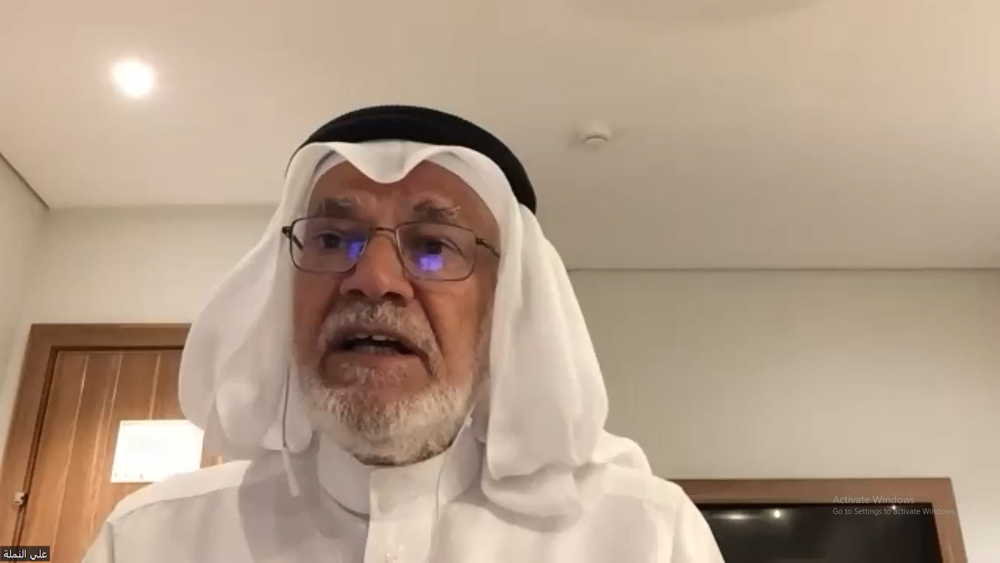
Dr. Ali Ibrahim H. Namlah, Professor of Higher Studies, Imam Muhammad Bin Saud University, Riyadh, KSA, was the key speaker of the session who spoke on “Was Muhammad Asad an Orientalist? An Explanatory Pause”. He contended that Asad was not an orientalist; he was a traveler. He was not a spy, and nobody knew if he was a Muslim or not. He wrote a few articles before embracing Islam. He took 13 years to explain what Islam was. He said that some scholars considered him an orientalist, but that was not correct. It was not easy for a scholar to translate the meaning of Al-Qur’an. It was also difficult to translate Hadith, he added.
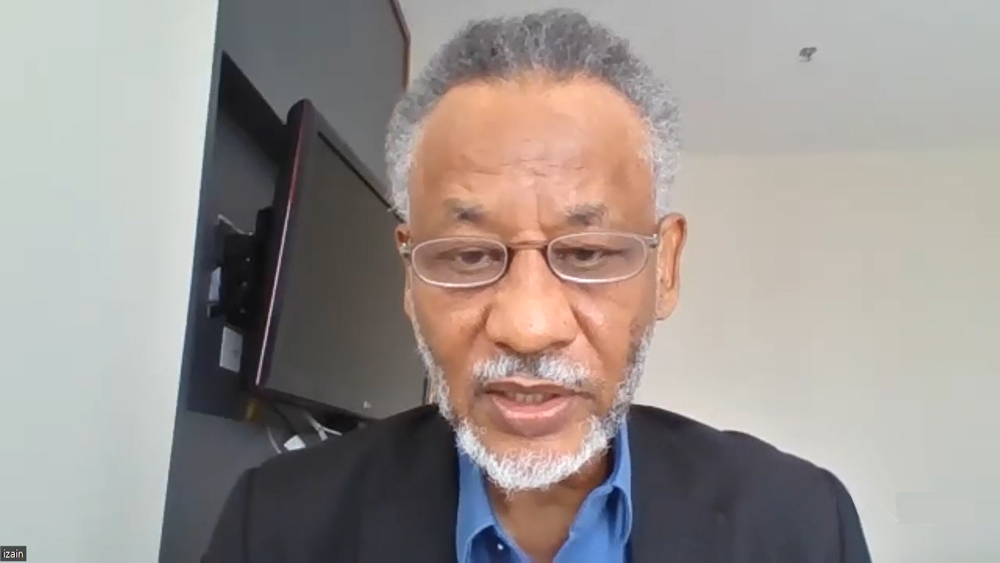
He was followed by Dr. Ibrahim Mohamed Zain, professor of Islamic Studies & Comparative Religion, Hamad Bin Khalifa University, Doha, Qatar, who said that Asad was a great thinker of the 20th century. The twentieth century assumed cultural and political importance because the issues of language and ideology predominated it. Commenting on the features of the 20th century, he said that the decolonization process began during the period which also witnessed the independence of most of the Muslim countries. The idea of constitutionalism also developed during the period. Besides the beginning of the constitutional movement in Iran, the idea of Islamic revivalism grew in the last century. Among other developments that marked the 20th century, it included the creation of Israel as a nation-state and the abolition of the Caliphate as an institution in Turkey. He said that Asad was a European Jew who learnt English, Arabic, French, German and Hebrew. He wanted to make sense of the Qur’an and convey its message to English-knowing Muslims and non-Muslims. He critiqued modernity and secularism, Dr. Zain held.
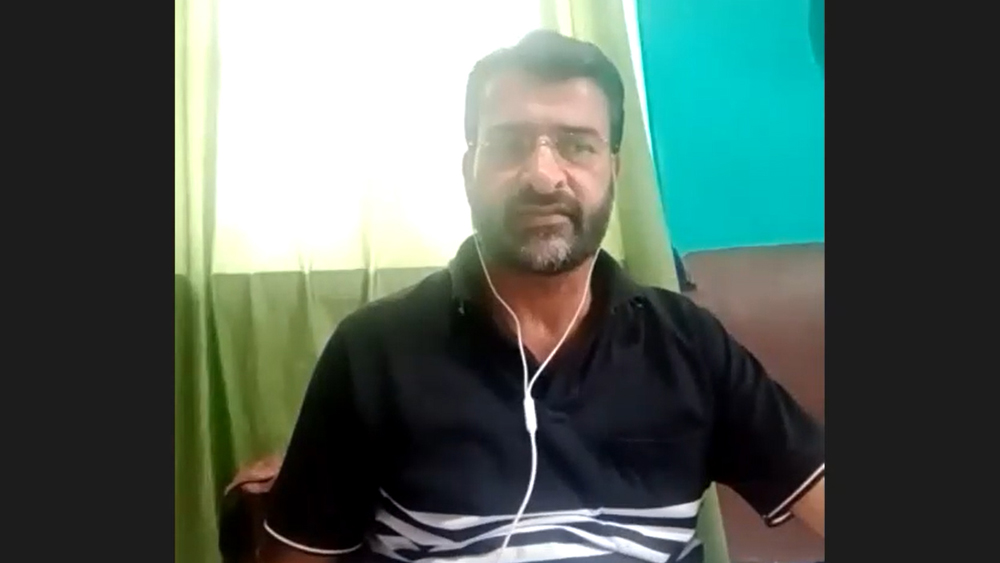
The third speaker of the session was Dr. Ali Muhammad, Assistant Professor, Islamic University of Science & Technology, Srinagar. In his paper, titled “Scheme of Governing in Political Thought of Muhammad Asad,” he noted that Islamic political thought was the outcome of human affairs originating from the Prophet Muhammad (570-632 AD) in 7th century Arabia to disseminate justice across the human globe. He guided humans through divine primacy and established a community based on true human representation and ruling through equality and justice. He said that Muhammad Asad developed his political thought for the establishment of a state which implements justice and equality. He was followed by Dr. Peshimam Nazeer Ahmed, Educational Consultant, Tirupattur, Tamil Nadu. His topic was “Personality and Contribution of Muhammad Asad as an International Journalist, Linguist, Political Theorist, Mufassir and Scholar of Religions in 20th Century”. He described Muhammad Asad as the most important Islamic scholar of the 20th century. He converted to Sunni Islam after his travels to the Middle East. Dr. Allama Iqbal was impressed by the works of Asad. He played a big role in the codification of Islamic law in Pakistan. He held a prestigious position in Pakistan and also served as the permanent representative of that country in the UN. Ms. Ishrat Nabi, Research Scholar, Islamic University of Science and Technology, Srinagar, was the last speaker who touched upon ‘Social and Political Themes in Muhammad Asad's Religious Thought’. She said that Asad talked about equality and believed that Islam surpassed any other ideology and culture. Islam was above caste, colour and race.
The session ended with a vote of thanks proposed by Prof. Haseena Hashia.
Second Day: May 29, 2022
Technical Session-III
The third technical session was chaired by Dr. Josef Linnhoff. The session was devoted to the theme ‘Muhammad Asad’s Understanding of Religions and Contribution to Islamic Literature and Conversion’.
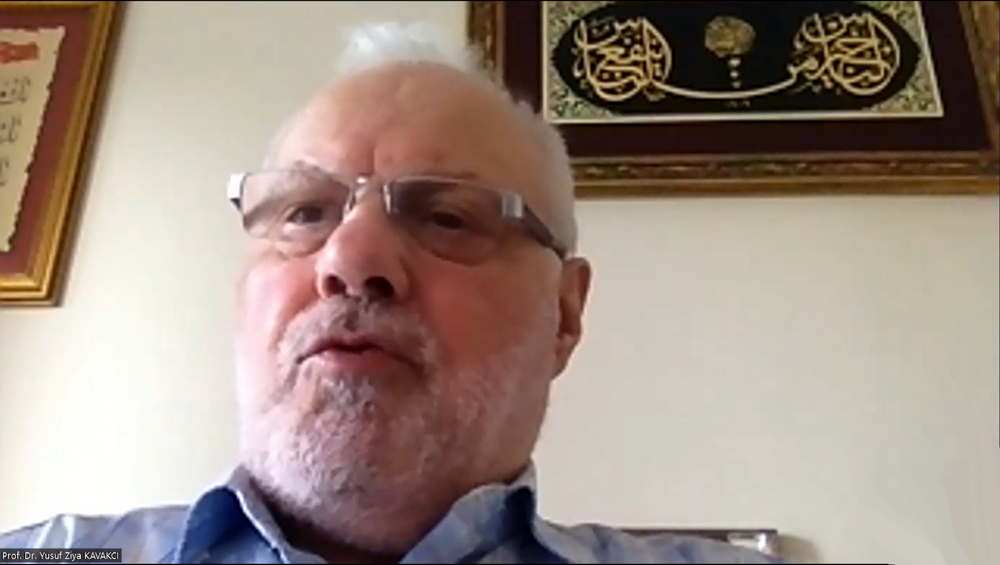
Prof. Yusuf Ziya Kavakci, Founder Dean, Faculty of Theology, Ataturk University, & Founding IANT Quranic Academy, Texas, USA was the first key speaker of the session, who spoke on “Focusing Muhammad Asad’s Work Translated into Turkish and His Influence on Turkish Intellectuals, Islamic Thinkers and Activists”. He said that Asad was at Istanbul University between 1961-1964. He attended a conference on the contribution of Islam in Manchester. His translation of the Qur’an was also translated into the Turkish language. He was well-versed in both German and French. In those days, Turkish people did not know any other language than Turkish. He said that one of the hurdles to research work was the lack of money. IIIT had many branches in different countries with excellent work in the field of research. But the times had changed, and enough money was not available for research, he added. He was followed by Prof. Imtiyaz Yusuf, Associate Professor, ISTAC, Malaysia. He spoke on “Muhammad Asad: After Conversion in the Eyes of the Jews”. Referring to Asad’s conversion to Islam, he said that according to Halakhah (Jewish law), a Jew remained a Jew even after conversion to any other religion. He said that the American author and social historian Judd L. Teller criticized Asad. According to him, Asad romanticized Arabian women because he was a journalist. Prof. Martin Kramer, an American-Israeli scholar of the Middle East at Shalem College in Jerusalem, also said that Asad was rejected by the Arabs. He observed that Asad’s father was a scholar. He was concerned about the persecution of Jews in Hitler’s Germany. Maulana Abul Ala Maududi called him a modern Muslim. He said that despite criticism, Asad continued to be popular in India and Pakistan. He was a post-liberal person and anti-Zionist who did not figure out the Jewishness of Judaism, Prof. Yusuf noted.
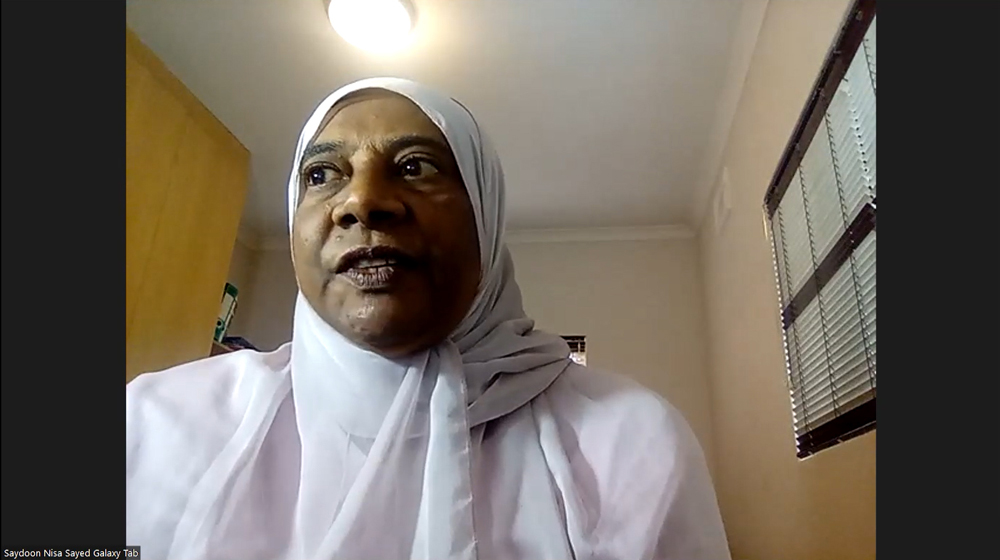
Ms. Saydoon Nisa Sayed, Coordinator, Global Network of Religions for Children, The African Union Interfaith Dialogue Forum Steering Committee, South Africa, concentrated on “Influences on Religious Thought of Muhammad Asad and His Conversion to Islam and His Contribution to Islamic Literature and Understanding”. She observed that Asad was the author and translator of the Qur’an and a cultural mediator between Europe and Islam. He presented 20 points of Islam to impress non-Muslims. Asad’s encounter with Islam began during his visit to Palestine as a journalist. He used to send his stories about Palestine to the French newspaper. He wrote about the causes of why the Prophet Muhammad (PBUH) was sent to Arabia. She said that Asad’s translation of the Qur’an was treated on par with the translations of Pickthall and Abdullah Yusuf Ali. She added that as a white, Asad was tolerated in the Middle East, which was inhabited by blacks. She insisted that he was a Muslim activist who contributed to Islam. Prof. Syed Jamaluddin opined that the translations of the Qur’an by Muhammad Asad and Dr. T. B. Irving were made keeping in mind the modern context. In this respect, Asad’s translation was more centered on the meaning and spirit of the Qur’an. He said that the Jordanian and Syrian translations were classical and conventional ones. He was described as a European gift to Islam. He noted that Asad’s and Irving’s translations were important because of the novel understanding of the Qur’an. Both of the translations had explanatory notes.
Ms. Amna Abdulkarim, M.A. in Comparative Religions, College of Islamic Studies, Hamad Bin Khalifa University, Doha, Qatar, presented the paper on "Conversion to Islam: Manifestations and Results of Muhammad Asad’s Religious Experience”. She said that Asad’s grandfather had converted to Christianity. He met several Muslim scholars during his visit to Palestine and Afghanistan. He wrote several books which had been translated into Arabic, she observed. Dr. Abroo Aman Andrabi, Sr. Assistant Professor, Dept. of Islamic Studies, Jamia Hamdard, New Delhi, focused on “Translating Holy Qur’an into English Language: Muhammad Asad’s Approach”. She compared Asad’s translation of the Qur’an with the translation of Pickthall, Abdullah Yusuf Ali and Maulana Abdul Majid Daryabadi. He spent about 20 years understanding the meaning of the Qur’anic words in English. He not only rendered the Qur’an into English but also wrote a commentary on it. She held that “The Message of the Qur’an” was valuable for both Muslims and non-Muslims.
Dr. Bilal Ahmad Kutty, Assistant Professor, Dept. of Islamic Studies, Aligarh Muslim University, Aligarh, touched upon the topic “Muhammad Asad’s Understanding of Islam”. He noted that three years after his death in Spain in 1992, Asad remained virtually unknown in the West and an enigma to an average Muslim. To understand how Muslims could regenerate themselves, Asad took a characteristic approach—he immersed himself in understanding the source of Islam and the Qur’an, he said. Ms. Ruqyya Aslam, Research Scholar in Islamic Studies, Aligarh Muslim University, Aligarh, presented her paper on “Muhammad Asad: His Life and Contributions to Islamic Literature”. She said that Muhammad Asad would never have thought that a journey that was meant for a vacation would change his life forever. Asad tried to find a way to lift Muslims out of their backwardness and inspired them to resist other cultures by appealing to the trust that Muslims had among themselves, she pointed out.
Technical Session-IV
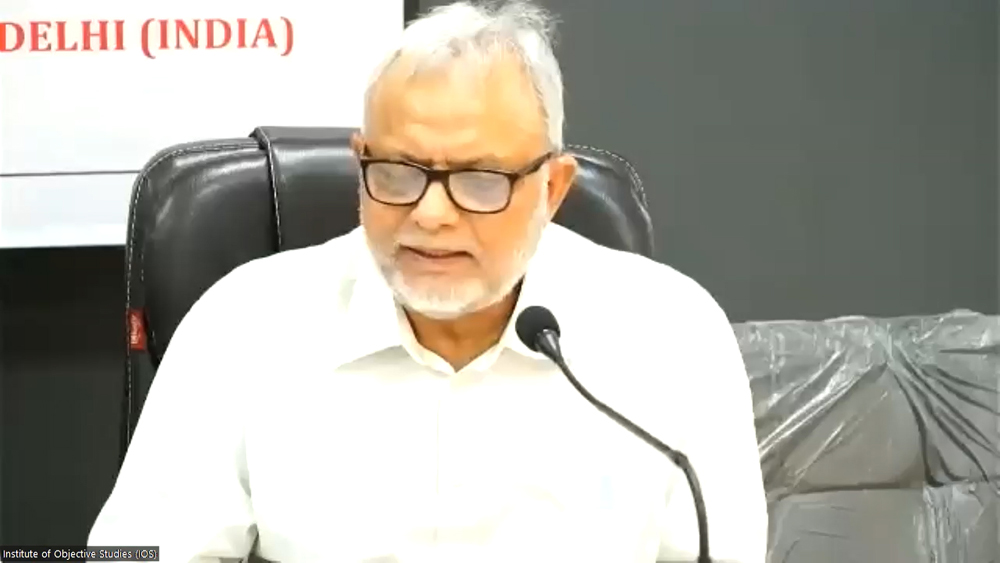
The fourth session focused on ‘Muhammad Asad’s Responses to Western Political Thought and Encounters to it from East’. Chaired by the chairperson, Prof. M. Ishaque, former head, Dept. of Islamic Studies, Jamia Millia Islamia, New Delhi.
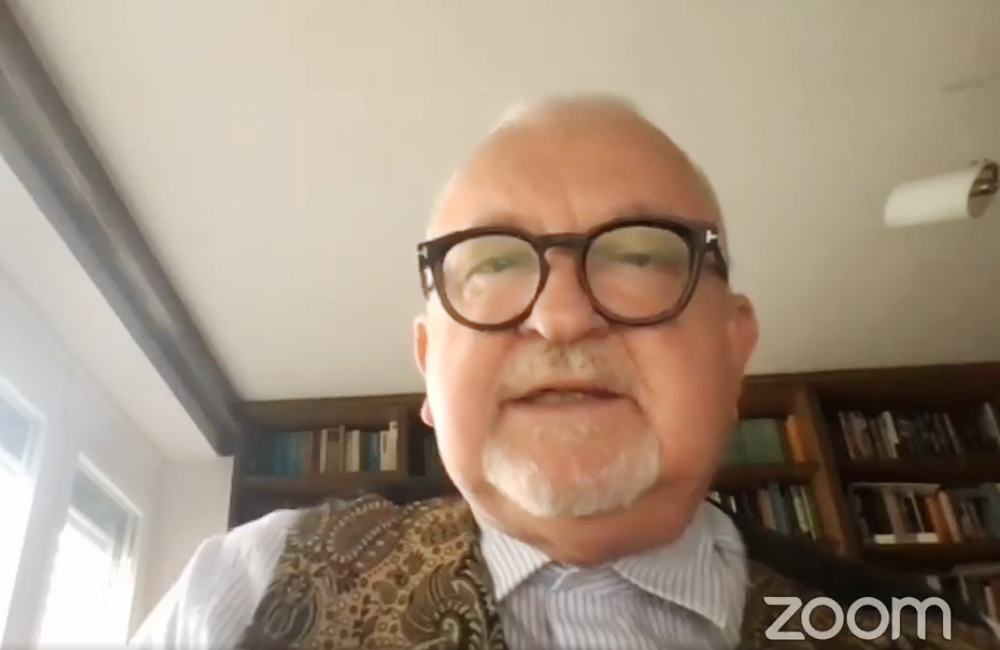
The session had Dr. Mustafa Ceric, Former Grand Mufti of Bosnia who spoke on “The Personality of Muhammad Asad is a Proof of Islamic Inclusive (Wasatiyyah) Theology”. He said that Jew had other ideas about God, which meant that Jews could convert to Christianity to save themselves. He said that there were 700 verses on the covenant relating to faith. The Qur’an is an open book to everyone. He was very sharp and always supported the Palestinian cause, Dr. Ceric added.
.jpg)
Dr. Adian Husaini, Chairman, Indonesian Islamic Da’awah Council, Jakarta & Dr. Nirwan Syafrin, Senior Lecturer, Ibn Khaldun University, Bogor, from Indonesia respectively, spoke on “Muhammad Asad’s Critical Insight on Western Civilization”. They said that Muslims were confused because of the misunderstanding created by Western scholars. Islam could move ahead if it was capable of answering the questions posed by the West. He said there was a danger of imitating the West individually and collectively. Some Muslim scholars were unduly influenced by Western thinkers. He further noted that Muslims did not possess comprehensive knowledge of Islamic civilization. They also did not have deep knowledge of Western civilization that was the reason why they failed to convince Western scholars. Western world view was changing as it was not stable. In Western thought, the soul was nothing. It was not spiritual but comforting. He said that Christianity was the victim of Western civilization. One had to be selective and critical of some of Asad’s views. He was also influenced by Western thought. West had a material view of life, he added. Prof. Obaidullah Fahad, Professor of Islamic Studies, Aligarh Muslim University, Aligarh, based his talk on “Islamic Shoura and Western Democracy: A Critique to Muhammad Asad”. He held that Asad was the champion of Islamic revivalism in the 20th century. He opined that after Khulfai Rashideen, the Islamic state was not purely Islamic. Modern forms of government were modelled on Western culture and civilization. He observed that the presidential form of government was closer to the Caliphate. Though Asad was a profound scholar of the Qur’an, some of the Prophetic traditions quoted by him were not correct, he added.
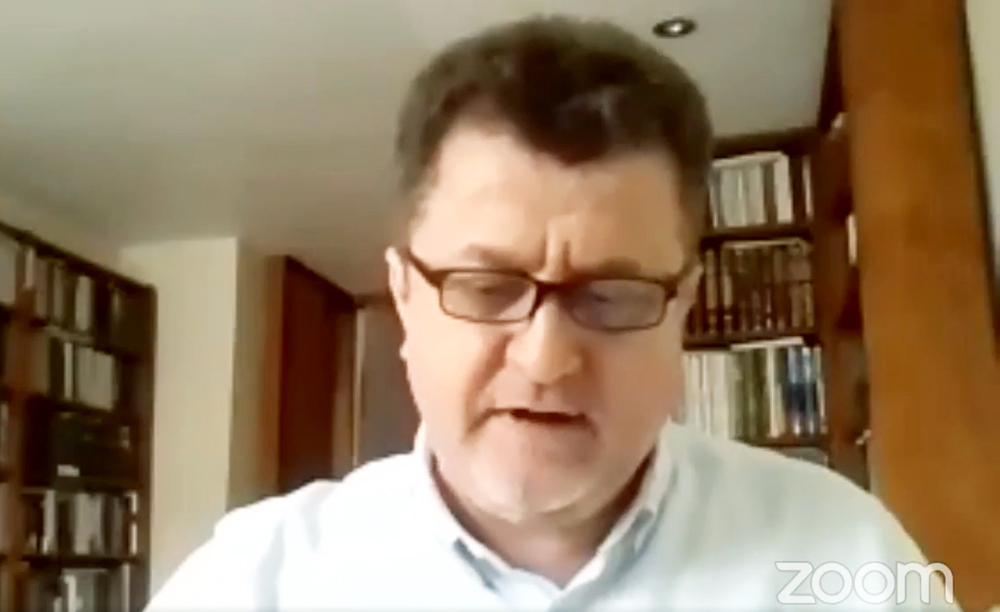
Prof. Safvet Mustafa Khalilovitch, Professor of Interpretation and Sciences of the Qur’an and the Prophet’s Biography, University of Zenica, Bosnia & Herzegovina, threw light on “Muhammad Asad’s Position on Western Civilization”. Dr. Mohammad Muslim, Asstt. Professor of Islamic Studies, Aligarh Muslim University, Aligarh, devoted his paper on “Muhammad Asad’s Response to Western Culture”. He held that according to Asad, imitation of the Western way of life by Muslims was undoubtedly the greatest danger to the existence and revival of Islamic civilization. To him, it was wrong to say that the progress of Muslims was not possible without adopting the social and economic rules of the west, he commented. Ms. Oroos Nasim, Research Scholar, Dept. of Islamic Studies, Aligarh Muslim University, Aligarh, who was the last speaker of the session, focused on “Muhammad Asad: A Mediator between Western and Islamic World”. She held that Muhammad Asad’s contribution to Islam was an undeniable fact that he deserved to be on the list of Islamic intellectual figures of the 20th century. She said that Asad criticized the concept of religion in the West and discussed the concept of religion in Islam.
Technical Session-V
Chaired by Prof. M. Afzal Wani, Vice-chairman, IOS & Professor of Law and Director, Coordination, GGS, IP University, Delhi, the fifth session focused on ‘Muhammad Asad’s perspectives about Political Reconstruction in 20th Century’.
Dr. Showkat Ahmad Dar, Assistant Professor, Dept. of Islamic Studies, Government Degree College, Shopian, Jammu & Kashmir, was the first speaker of the session who spoke on “A Critical Evaluation of Asad’s ‘The Principles State and Government in Islam’”. He described Asad as one of the greatest Muslim scholars of the 20th century, a prolific writer, international journalist, linguist, political theorist and Mufassir. He witnessed major events of the 20th century and travelled to almost every Muslim country. He abandoned further travels on the advice of Dr. Allama Iqbal. He was against the concept of modern secular state. He also opposed the notion of Khilafah in its form and structure, Dr. Dar added.

He was followed by Dr. Abdulrahman Al Mahmoud, Chairman of the Board of Trustees of Islamic Dawah Organisation, Khartoum, Qatar, who touched upon the topic “Muhammad Asad: His Role and Impact on International Level”. He said that most European Muslims considered Asad as a great Islamic scholar of the 20th century. According to them, he used original sources of the Qur’an and Sunnah, Dr. Mahmoud observed. Prof. Dr. Koutoub Moustapha Sano, Secretary General, International Islamic Fiqh Academy, Jeddah, KSA, centered on “Ideas of Muhammad Asad and their Contemporary Relevance”. He noted that Asad was an encyclopedia to write everything. He influenced Muslims living in Europe and USA. He said that Asad was the only European Muslim who made such a contribution. He was an impassionate believer of Islam. He believed in the divine origin of the Qur’an. He was disappointed over the big gap between Islam’s principles and practices. He was not a rejectionist of the relationship between religion and modernity. Dr. Sano regretted that Asad was ignored by the countries of the Middle East.

Dr. Pipip Achmad Rifai Hasan, Magister Program of Islamic Studies, Paramadina University, Jakarta, Indonesia, elaborated on “Muhammad Asad's Proposal of a Modern Model State and the Political and Economic Conditions of Muslim Countries”. He observed that throughout his life, Asad was dedicated to the cultural, intellectual and spiritual renaissance of Muslims. To achieve these ideals, he believed that Islam should become a programme of life. The establishment of a truly Islamic polity was imperative for Muslims who believed in establishing the tenets of Islam into action, Dr. Hasan said. Dr. Aijaz Ahmed, Assistant Professor of Islamic Studies, Aligarh Muslim University, Aligarh, presented his paper on “Muhammad Asad’s Concept of an Islamic State”. He said that Muhammad Asad was a distinguished Islamic scholar and a fully and strongly committed Muslim whose life goal was the cultural, intellectual and spiritual renaissance of the Muslims of the world. In order to achieve these ideals, Islam became the programme of his life. He observed that Muhammad Asad came forward with the idea that a modern Islamic country should be based on a modern political structure that fulfilled both the requirements of the Qur’an and Sunnah.
Dr. Lubna Naaz, Guest Faculty in Islamic Studies, Women’s College, Aligarh Muslim University, Aligarh, in her presentation, said that the concept of the state in Islam was the subject matter of a number of both modern Muslim thinkers and Orientalists. Muhammad Asad’s writings made a rational evaluation of the West’s basic philosophy to clear the doubts created about the Islam. He broke new ground by exploring various political forms of the state and the wisdom behind the unwritten nature of the Islamic constitution, she pointed out. Dr. Arshi Shoaib, Assistant Professor, Women’s College, Aligarh Muslim University, Aligarh, focused, among other things, on Asad’s change of religion and his sincerity. The last speaker of the session was Gh. Mohd. Sheikh, Senior Research Scholar, Shah-i-Hamadan Institute of Islamic Studies, University of Kashmir, Srinagar. In his paper, he said that the notion of establishing a government was propagated and renovated by prominent Muslim scholars of the 20th century like Muhammad Jamal al-Din al-Afghani, Rashid Rida, Allama Iqbal, Hasan al-Banna, Syed Qutb, Maulana Maududi, Ayatollah Khomeini, and Muhammad Asad. Among these scholars, Muhammad Asad was regarded as a bridge between the East and West because his views were mixed with classical and modern concepts, which were favourable for all the readers. After conversion to Islam, Muhammad Asad’s enthusiastic dream was the revival and resurgence of Islam in the light of basic sources of Islam, he concluded.
Valedictory Session

Speaking as a guest of honour, Dr. Ali Ibrahim H. Namlah, said that Muhammad Asad was an unusual Muslim scholar. He noted that the papers presented at the conference helped him understand Muhammad Asad better. He urged the community to honour both past and present Islamic scholars. He hoped that all the papers read at the conference would come out in book form. Another guest of honour was Dr. Ibrahim Mohamed Zain, who lauded the IOS chairman Dr. M. Manzoor Alam, for organizing a very important conference. He described Dr. Alam as a mentor and a guiding spirit. He said that paper presentations by women made a mark at the conference. Asad wrote his own biography. He said that any narrative should be balanced. He was a friend of Shah Faisal and Ahmed Zaki Yamani. He held that Asad theorized a new concept of the nation-state. He was against Khilafah, Dr. Zain added.
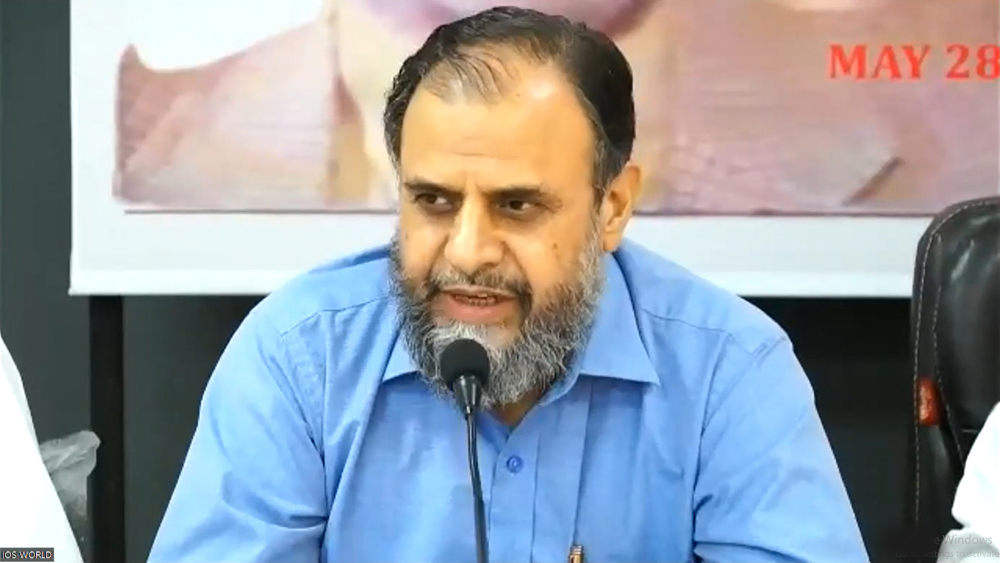
In his valedictory address, Prof. M. Afzal Wani called for building better human culture and institutions. Referring to Muhammad Asad, he said that he (Asad) wanted to do something extraordinary. He was a pious soul as well as uncompromising in nature. He travelled to Palestine, Arabia, Afghanistan and the Indian sub-continent. He had a creative mind and understood the faith in its true spirit. He tried to maintain himself as an independent thinker and writer. He was against the Khilafah and favoured the presidential form of government. Commenting on the activities of the IOS, he said it was constantly focusing on the issues confronting humanity. The institute is like the light in the darkness, he held.
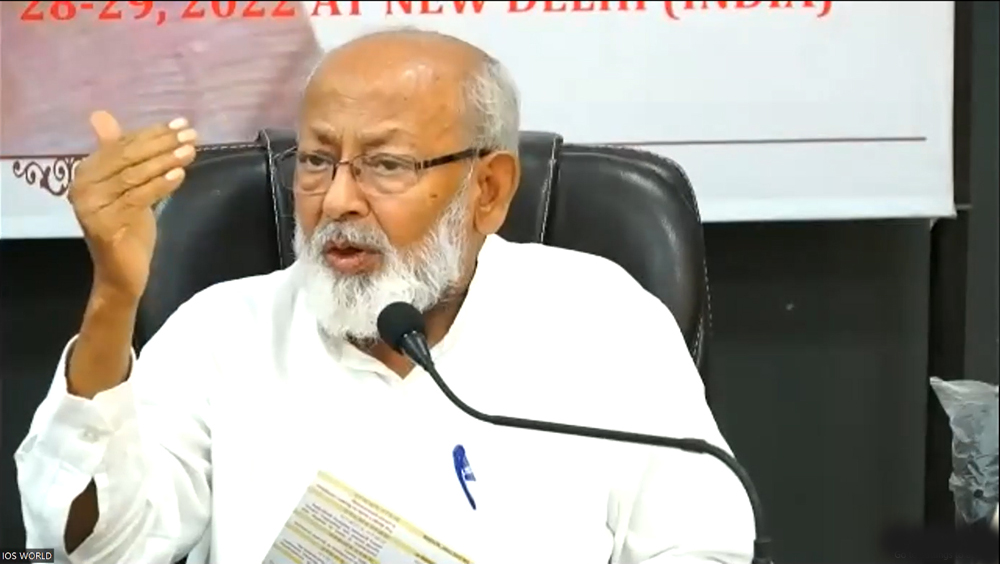
Presiding over the session, Dr. M. Manzoor Alam counseled that a student should be a serious learner and humble. Making a reference to Muhammad Asad, he said that he was a Mujaddid. He used Ijtihad as a tool to convey the message of the Qur’an and Sunnah because it developed faculty of mind and intellect. In order to imbibe the spirit of Kalimatullah Hiyal Uliya, 117 booklet had been published by the IOS in Indian and foreign languages, besides 63 booklets on Asma-i-Hasanah being in the pipeline. He held that Asad’s translation of “The Message of the Qur’an” was close to the language of the Holy Book. He asked the Islamic scholars to determine how the human beings respect could be restored in the Qur’anic sense. He pleaded for Ilm Nafay, which could be beneficial for the humankind. He held that Ijtihad should be used as a tool to guide humanity.
On this occasion, a 6-point resolution, moved by Prof. M. Ishaque, was unanimously adopted by the participants. The resolution said as:
The conference adopted a 6-point resolution in its valedictory session which are as follows:
- That the life and contribution of Muhammad Asad being most relevant to the developments in 20th century in terms of thought, ideologies, and political, economic and social systems, should be studied with due concern to understand best intellectual trends in the recent past and now prevailing thought and practices.
- That the world over, even after very significant developments in sciences and technology, people continuously suffer due to prevailing contradictions in belief, faulty economic policies, war culture and disharmony, there is a call for attention of the responses of scholars like Muhammad Asad to adopt a course correction for giving right and balanced shape and direction to existing academic and research cultures.
- That the existing institutions and universities should have specific research programmes for exploring the socio-economic and political environment, with responses of Muhammad Asad to that, through his literary endeavors and actual performances by working in different capacities.
- That proper methodologies should be developed for inter-religious understanding as has been adopted by Muhammad Asad to deliver the facts with original flavors and natural essence.
- That a very focused research programmes may be adopted to further understand Muhammad Asad’s responses to Western political thought and its practice now.
- That there should be a facilitation of the communication and collaboration among the scholars interested in this discipline for frequent exchange of ideas and propagation.
The conference ended with a vote of thanks extended by Prof. Haseena Hashia.
Go Back